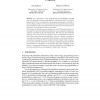Free Online Productivity Tools
i2Speak
i2Symbol
i2OCR
iTex2Img
iWeb2Print
iWeb2Shot
i2Type
iPdf2Split
iPdf2Merge
i2Bopomofo
i2Arabic
i2Style
i2Image
i2PDF
iLatex2Rtf
Sci2ools
LPNMR
2005
Springer
2005
Springer
Revisiting the Semantics of Interval Probabilistic Logic Programs
Two approaches to logic programming with probabilities emerged over time: bayesian reasoning and probabilistic satisfiability (PSAT). The attractiveness of the former is in tying the logic programming research to the body of work on Bayes networks. The second approach ties computationally reasoning about probabilities with linear programming, and allows for natural expression of imprecision in probabilities via the use of intervals. In this paper we construct precise semantics for one PSAT-based formalism for reasoning with inteval probabilities, probabilistic logic programs (p-programs), orignally considered by Ng and Subrahmanian. We show that the probability ranges of atoms and formulas in p-programs cannot be expressed as single intervals. We construct the prescise description of the set of models of p-programs and study the computational complexity if this problem, as well as the problem of consistency of a p-program. We also study the conditions under which our semantics coincid...
Related Content
| Added | 28 Jun 2010 |
| Updated | 28 Jun 2010 |
| Type | Conference |
| Year | 2005 |
| Where | LPNMR |
| Authors | Alex Dekhtyar, Michael I. Dekhtyar |
Comments (0)

